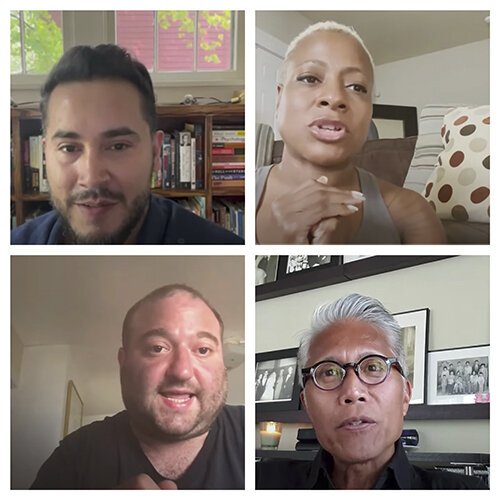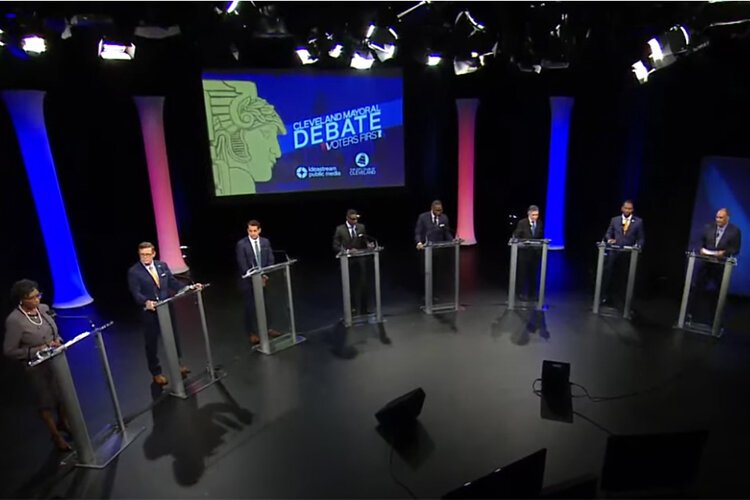What did residents think of Cleveland mayoral candidates’ responses to their questions?
Northeast Ohio residents got the opportunity to question seven candidates for Cleveland mayor about their priorities on public safety, racial equity, and more last week during a mayoral debate coordinated by Ideastream Public Media and the City Club of Cleveland.
At a second mayoral debate this Tuesday, Aug. 17, candidates will field questions on topics including the economy and the environment. But what did the residents who posed their own questions during the first debate think about the responses they heard from the candidates?
Some of the residents, like North Collinwood resident Samantha Pierce, said they weren’t happy with those responses. In her question, she told the candidates that she didn’t feel safe when calling the police, “for anything.”
 “I fear that when I call the police, for say, noise in the neighborhood or whatever, that I actually put my neighbors in danger by calling the police,” she said during the forum. “I’d like to know what you as mayor will do to make people like me feel safe again, and rely on those that are supposed to be there to serve you?”
“I fear that when I call the police, for say, noise in the neighborhood or whatever, that I actually put my neighbors in danger by calling the police,” she said during the forum. “I’d like to know what you as mayor will do to make people like me feel safe again, and rely on those that are supposed to be there to serve you?”
Pierce, who is a personal trainer and runs a nonprofit devoted to helping parents who have lost infant children, said the question came to her after her neighbors woke her up in the early hours of the morning with loud partying.
“I thought, ‘I can’t call the cops because those black men would be in danger,’” Pierce said, citing George Floyd’s killing by a Minneapolis police officer, among other high-profile cases of racial bias among police.
In response to her question, Cleveland city councilperson Basheer Jones said he recognizes that most police calls are for domestic issues, and as mayor, he would create a “mobile crisis unit” staffed with police and mental health professionals who would respond to calls. He said Cleveland officers need better equipment and training, but said he doesn’t necessarily think Cleveland needs to hire more officers.
Former Cleveland councilperson Zack Reed, meanwhile, said he believes Pierce should feel safe calling the police (he’s previously advocated for hiring more police officers). He highlighted his 10-point safety plan, which he said advocates for a “proactive” approach to crime, bringing officers in to target high-crime areas and “community service” units to parks, schools and recreation centers, on top of focusing on reforming offenders rather than jailing them.
Ross DiBello, a lawyer and first-time candidate, said a change in culture is needed among Cleveland police officers, and advocated for the Safer Cleveland charter amendment which proposes a permanent Cleveland Community Police Commission that would have significant oversight over police disciplinary issues. First-time candidate and nonprofit executive Justin Bibb and DiBello are the only other candidates who have come out staunchly in favor of the amendment.
Pierce said she wasn’t excited about any of those candidates’ responses, although she said she wanted to hear more from Bibb on the matter. Part of Bibb’s plan, he said in response to a different question, would be to create a fourth option for the 911 system to send out a mental health professional in response to a mental health crisis, instead of a police officer.
While all of the candidates on the stage advocated for a co-responder model, where mental health professionals go out with police on calls to de-escalate incidents before they become violent, Pierce said she was concerned about that model. She argued that it’s the police themselves who should have some kind of degree in social work before they can be hired.
Pierce, who herself has a degree in social work, said police aren’t trained to ask the right questions, to learn about the trauma that somebody might have that can lead to a mental health crisis.
“If someone is going to respond to your trauma, they need to be trained in trauma,” she said.
More discussion on policing
Chris Martin, an Ohio City resident, asked the candidates a similar question around policing.
“Cleveland has more cops per resident than 93% of cities,” Martin said. “Every resident of Cleveland pays $838 for cops every year, and we spent about $6,700 per person over the last decade on police misconduct settlements. Why do you think more cops is the answer?”
Former Cleveland mayor Dennis Kucinich, who has advocated for the hiring of 400 more police on top of 100 “safety assistants,” said more police are necessary to face the spike in violent crime Cleveland has seen.
“I say that in the face of a siege of crime affecting so many of our neighborhoods, of drive-by shootings that are terrorizing communities, of gangs that ride wild from east side to west side on dirt bikes and ATMS (sic), shooting guns off,” he said.
Current Cleveland city council president Kevin Kelley took Kucinich to task for those claims, arguing that it’s “irresponsible” to “throw out a number” of police that should be hired without any analysis of the need. He said Kucinich had promised to hire 200 police officers back in 1977, despite low staffing levels of officers and firefighters that year. Kelley has previously advocated for hiring more police to fill vacant spots, as well as increased “community policing” with neighborhood patrols.
Kucinich responded that Kelley, as “co-mayor” of the city over the last seven years, is responsible for understaffing in the police department.
Meanwhile, Ohio senator Sandra Williams said she also supports hiring more police in Cleveland, noting that for residents she’s talked to, stopping violent crime is their number one concern. Her approach would involve hiring more officers of color, increasing cultural competency training they receive, and advocating for changing state laws to prevent guns from making it onto the streets.
Martin, who asked the question, said he was disappointed in the candidates’ responses. He said he didn’t think any of them actually engaged with his concern that Cleveland is “overpoliced.”
“It’s a matter of opportunity cost,” he said. “When we Clevelanders, who live in the nation’s poorest big city, spend a third of a billion dollars on policing, that means less lead abatement, that means less after school programming, that means fewer public restrooms, that means fewer dollars for the electrical system at the West Side Market. Government shows what it values by what it spends.”
Questions about Asian-American hate and budgeting
Ray Hom, a resident of Cleveland’s AsiaTown neighborhood, asked the candidates what they would do about surging rates of violence and discrimination against Asian-Americans that have intensified since the pandemic began.
Editor’s note:Hom is a contributor to The Cleveland Observer, which is a NEO SoJo partner.
This spawned a broader discussion among the candidates about how they would attempt to crack down on incidents of hate and bias against the Asian-American community.
Hom said he was thoroughly pleased with the discussion, which included: a pledge from candidate Bibb to hire more Asian-Americans to leadership roles and a pledge from Kelly to hire more people who “look like the city” they live in; a pledge from Jones for the city to do more business with minorities in general; and a tense moment between Reed and Williams where Reed blasted other candidates for allegedly not showing up to an anti-Asian-American hate rally, while Williams shot back that support for the Asian-American community is more than just showing up when “cameras are rolling.”
Hom said he particularly liked Bibb’s response, which included a commitment to hire a “chief equity officer” to review all of the city’s decisions through a racial equity lens.
“There’s young leaders that are surfacing. Let’s build those folks into leadership roles, and have them participate in this process going forward,” Hom said.
Hom added that it’s rare to see Asian-Americans from his neighborhood in positions of authority in the city and sometimes that voice can be absent in public conversation. DiBello suggested that universal public comment during public meetings would help ease that issue.
In the portion of the debate dealing with government transparency, Lakewood resident Daniel Ortiz, outreach director for Policy Matters Ohio who works in Cleveland, asked the mayoral candidates if they would support the city adopting the principles of participatory budgeting, where citizens are given a direct say in how money is spent.
Both Ross DiBello and Justin Bibb, the only candidates to answer the question as the debate ran out of time, voiced significant support for implementing those practices into city government. DiBello said one of the main reasons he’s running is to provide citizens full transparency on where their tax dollars are going. Bibb said he wants to implement participatory budgeting to determine how some of the American Rescue Plan dollars are spent and as part of the normal city budgeting process for 2022.
Ortiz said he was glad to see that support, and noted he’d like to see more specificity from other candidates on the matter. He added that input from Cleveland residents should be built into these plans for participatory budgeting from the beginning.
Don’t forget to tune in Tuesday for the second mayoral forum, where more Northeast Ohio residents will ask their questions. These questions were collected by Ideastream Public Media, which coordinated the debate along with the City Club of Cleveland, and the Northeast Ohio Solutions Journalism Collaborative.
This story is sponsored by the Northeast Ohio Solutions Journalism Collaborative, which is composed of almost 20 Northeast Ohio news outlets including FreshWater Cleveland. Conor Morris is a corps member with Report for America. You can email him at conor@thedevilstrip.com.


